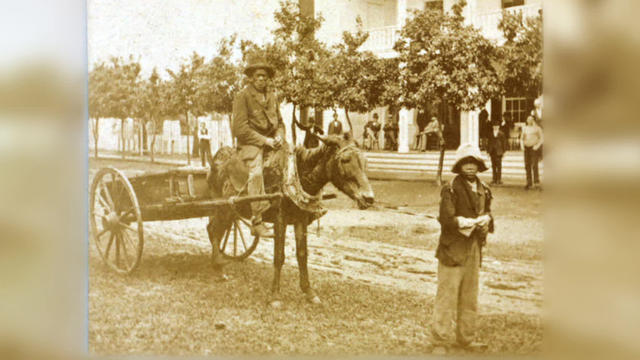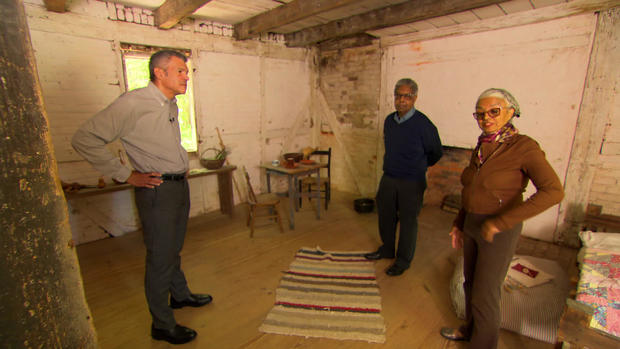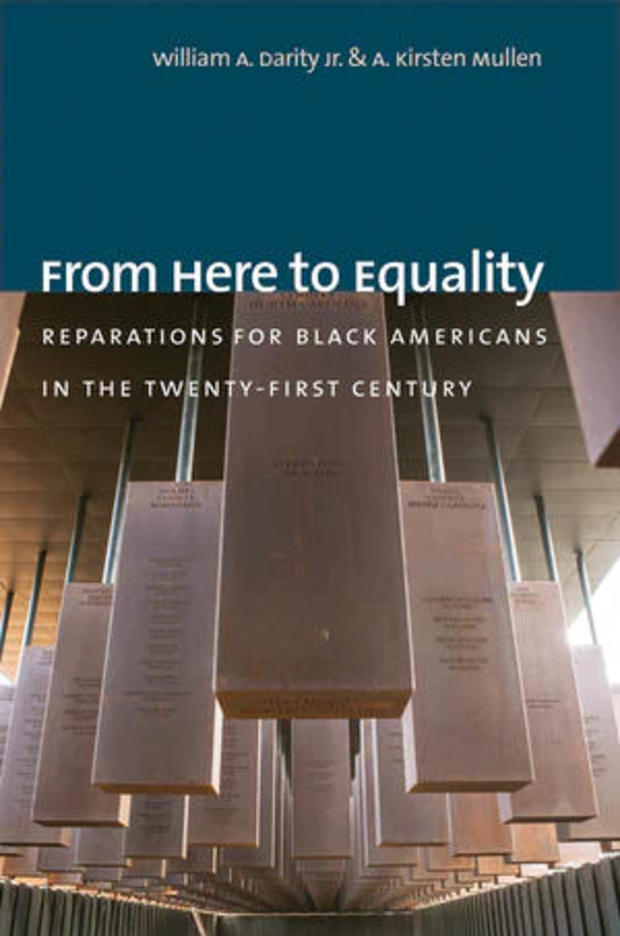▶ Watch Video: Are reparations the answer to America’s historic racial wealth gap?
The Stagville Plantation was once one of the largest plantations in North Carolina: 30,000 acres, with more than 900 enslaved people working the land.
A. Kirsten Mullen, a folklorist and arts consultant, and her husband, William Darity, an economics professor at Duke University, visited recently with “Sunday Morning” contributor Mark Whitaker.
Whitaker asked, “When you come to a place like this and you know that you have your own family, your own ancestors, who lived under these conditions, what do you think?”
“I don’t know that you’re ever prepared for it fully,” Mullen replied.
Walking into the slave quarters can be an emotional experience, even for those all-too-familiar with history. “I’m getting ready to cry now,” Mullen said. “Didn’t see that coming!
“It’s just extraordinary to me, the kind of daily abuse, not having control of your life, not being able to control and educate and nurture your own children, I just can’t imagine what that was like.”
They say when President Lincoln signed the Emancipation Proclamation in 1863 ending slavery those newly-freed were left with nothing. “The former slaveholders were back in control of the properties that they previously had held, and that meant that at a location like Stagville, the land was not distributed to the folks who had worked here,” Darity said.
The federal government famously promised those formerly enslaved “40 acres and a mule.” That promise was broken, as were many more to come. Mullen and Darity have become leading voices for the argument that, to this day, this country owes a debt to Black Americans: reparations.
“We’ve even argued that if the 40-acre land grants had been given, we wouldn’t need to have a conversation today about reparations for Black American descendants of U.S. slavery,” Darity said.
Whitaker asked, “There’re a lot of people, when they hear the debate about reparations, they think, ‘This was a long time ago. What relation does it have not only to my life and what I’ve done or haven’t done, but to today’s economy?'”
“So, we think of slavery in some ways as the first affirmative action program for White people – Free labor, how ’bout it?” Mullen replied.
As Whites acquired wealth, Blacks were repeatedly shut out, largely denied land by the Homestead Act of 1862, which gave settlers territory out West; then, Terrorized by Jim Crow; later, discriminated against when it came to the GI Bill after World War II or Social Security benefits, and by redlining and other practices which prevented home ownership.
Darity said, “Our case for reparations is anchored on the cumulative impact of racial injustice in the United States. And they’re manifest in a number of atrocities that continue to the present moment, including mass incarceration, including police executions of unarmed Blacks, including ongoing discrimination in employment, credit, and housing markets.”
When asked to describe how dramatic is the racial wealth gap, Ray Boshara, senior advisor at the Federal Reserve Bank of St. Louis, where he studies inequality, replied, “It’s pretty dramatic, Mark. The most recent data we have, 2019, shows that Blacks have about 12 cents in wealth for every $1.00 held by Whites.”
The median White household has $184,000 in wealth, while the median Black household has less than $23,000.
Whitaker asked, “Wealth acquisition is cumulative, it happens over generations. So, explain how that is different in Black America versus White America?”
“Wealth begets wealth; that’s the most fundamental principle here,” Boshara said. “In order to have wealth, you have to either get it from your government, or from your family, or from both. And the difference is this: our government, over the course of several centuries, was very active in determining who gets to build wealth, and who does not.”
Darity said, “Black Americans, particularly those who have ancestors who were enslaved in the United States, constitute about 12% of the nation’s population, but possess less than 2% of the nation’s wealth. This leads us into what we think is the appropriate target for a reparations project, which is to bring the Black share of wealth into consistency with the Black share of the population. And we estimate that this would require an expenditure somewhere in the vicinity of $11-12 trillion.”
That’s more than twice the entire current federal budget, and Darity estimates it would come to just under $300,000 paid to every eligible Black person in the country. It’s a big, big price tag, and polling this spring by the University of Massachusetts Amherst/WCVB shows almost two-thirds of Americans aren’t buying. Sixty-two percent said the government definitely or probably should not pay reparations, compared to 38 percent who the government definitely or probably should.
Jason Riley, a senior fellow at the Manhattan Institute, told Whitaker, “One of the great accomplishments of the civil rights movement was to get the government to stop picking winners and losers based on race. Reparations would be a step back in that direction. It would be a step backwards.”
Riley looks back to the anti-poverty programs more than 50 years ago under President Lyndon Johnson: “We’ve tried this before. What was the Great Society? If simply redistributing wealth addressed inequality or addressed poverty, we would have solved those things a long time ago.”
For the last three decades, a bill has been introduced in Congress every year to form a commission to study reparations. This is the first year it could be headed for a full House vote. It has not attracted support from Republicans. In the Senate, GOP Minority Leader Mitch McConnell said, “I don’t think reparations for something that happened 150 years ago for whom none of us currently living are responsible is a good idea.”
Cory Booker (D-N.J.) is the sponsor of the Senate version of the reparations study bill.
Whitaker asked, “All you’re calling for is a commission –why can’t you even get the votes for that?”
“Nothing that is worthwhile is easy,” Booker replied.
In the meantime, Booker is pushing a plan designed to narrow the wealth gap across all races for future generations, with so-called “baby bonds.” He described how it would work. “So, you’re born in America, the richest nation in the world. You get $1,000 in an interest-bearing account, and then every year, based upon the wealth of their family, they get money deposited into that. The lowest-income kids are gonna get the full $2,000 compounding. The wealthiest kids, the children of Bill Gates get nothing.”
“So, what do economists say? How much of an impact, over what period of time would that have on the wealth gap?”
“So, by the time kids are 18, the lowest-income kids will have about $50,000 to invest in wealth-building things,” Booker replied. “The economists say that you will literally – for that generation of children – close the racial wealth gap.”
President Biden has indicated his support for a reparations commission. [“We do ourselves no favors by pretending none of this ever happened”], but meanwhile, his administration is working on several tracks: announcing programs aimed specifically at Black Americans, including Black farmers and business-owners, but also anti-poverty programs that are race-neutral.
Whitaker asked Cedric Richmond, a senior advisor to the president, “President Biden went further than any president has ever gone in talking about the racial wealth gap and its historical roots. But he didn’t mention the word ‘reparations.’ Why not?”
“Well, I think the president has said since Day One that one of the things that he wanted to do as a priority was to tackle systemic racism and barriers and address the wealth gap, and we’re doing it,” Richmond replied.
“How long will it take for the proposals that you’re talking about to actually have the effect of allowing Black families to pass on wealth to their children and grandchildren?”
“Well, I think the first thing you have to do is decrease poverty right now. Continue to invest in education, prevent discrimination in homeownership and access to capital. And we think that that is the first meaningful step, so that this generation will have the wealth to pass down to the next generation.”
Or maybe the solution to the racial wealth gap is all of the above. “It’s what do you do looking back? What do you do ongoing right now? And then how do you look forward?” said Boshara. “And you have to really be working in all three of those areas if you want to make a meaningful dent in the racial wealth gap.”
Whitaker asked, “So, paying off the historical debt doesn’t necessarily, in and of itself, guarantee closing the gap? Meanwhile, closing the gap wouldn’t necessarily mean resolving the debt?”
“This is a problem that has accumulated for centuries. You can’t just solve the problem with just one payment, as robust as that might be,” Boshara said.
There’s the financial reckoning, but also a moral reckoning. Call it reparations or not; Booker believes it’s more than a matter of dollars and cents: “We are a nation that is still suffering self-inflicted wounds because we have not dealt with that original sin of slavery, and how it still affects us today. It is to all of our self-interest to get at this.”
For more info:
- “From Here to Equality: Reparations for Black Americans in the Twenty-First Century” by William A. Darity Jr. and A. Kirsten Mullen (University of North Carolina Press), in Hardcover, eBook and Audio formats, available via Amazon and Indiebound
- Stagville Plantation, Durham, N.C.
- Jason Riley, Manhattan Institute
- Ray Boshara, Federal Reserve Bank of St. Louis
- St. Louis Fed Study of Wealth Inequality
- Senator Cory Booker (D-N.J.)
Story produced by Alan Golds. Editor: Ed Givnish.




































